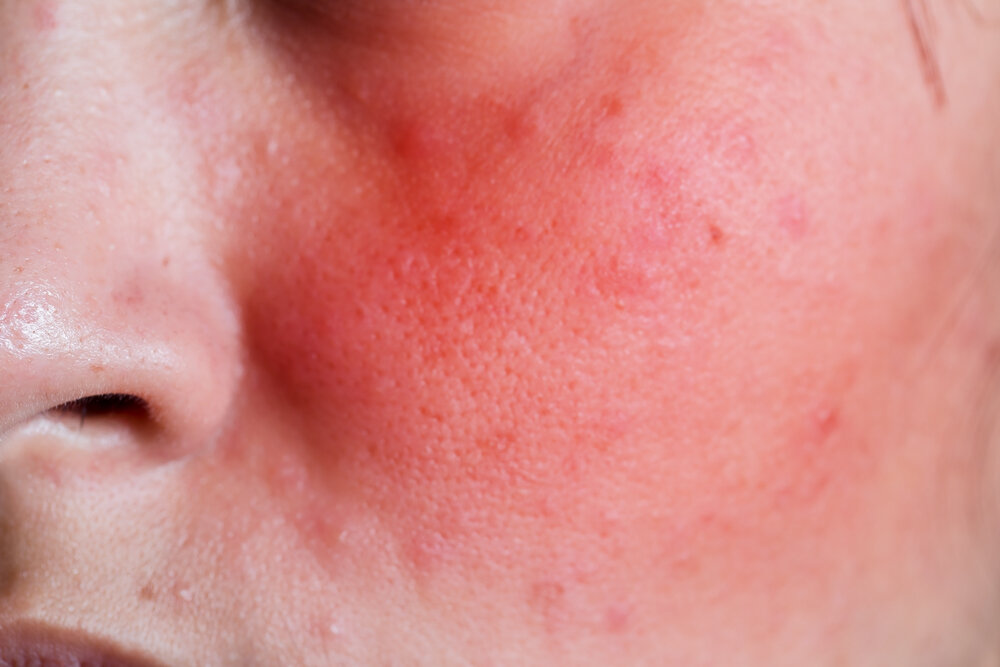Why Inflammation is at the Core of Your Skincare Woes
WHAT IS INFLAMMATION?
Inflammation happens when your body is trying to protect itself against infection, injury, an irritant, or disease. It's very normal and happens to everyone, and, in many cases, you wouldn't be able to heal without it.
WHAT CAUSES IT?
Inflammation can be triggered both internally (diet, stress, health conditions) and externally (pollution, sun exposure, air quality, exposure to irritants), contributing to unwanted skin conditions. Common symptoms of facial inflammation to look out for are: heat, pain, redness, and swelling.
WHY YOU SHOULD CARE
Treating the root cause of your inflammation could be a foundational step in achieving your other skincare goals.
HOW TO TREAT + PREVENT
There are so many healthy lifestyle changes you can make to prevent and combat inflammation. Those of which will ultimately lead to positive benefits in other areas of your life as well (healthier diet, mental stability, physical wellness).
Diet:
Sometimes, fighting inflammation can be as simple as changing up your diet. There are certain types of foods that can cause or worsen inflammation. If you feel your skin gets inflamed often, try removing or reducing saturated fats, fried foods, sugars, processed foods, alcohol, processed meats, trans fats and refined carbohydrates from your diet. In tangent with this, try introducing more anti-inflammatory foods into your diet, like: berries and cherries, fatty fish (like salmon or mackerel), broccoli, avocados, green tea, mushrooms (portobello and shiitake), spices like turmeric, ginger, and clove tomatoes. You may also want to your reduce caffeine intake, as excess caffeine can cause inflammation by way of anxiety/stress.
Skincare:
Try to get your stress under control by introducing some skincare self-care into your routine. We love setting aside some time for Gua Sha, a facial massage, or a hydrating mask a few times a week (these are also specifically great for combating inflammation!). We also recommend modifying your routine when your skin feels inflamed. Remember: less is more when it comes to inflammation—use cool to lukewarm water, go easy on the exfoliation, and use soothing ingredients only (we’ll get into which kinds of ingredients in a minute).
Pro-Tip: Use cold therapy when face feels hot and swollen by taking an ice cube or cold spoon and rubbing it on your face and neck.
Mentally:
As we previously mentioned, stress is a HUGE factor in the presence of inflammation. Try to combat that stress by introducing some meditation, journaling, deep breathing, or even listening to a self-help podcast into your daily routine. We recommend lighting a candle or incense while you do it (Frankincense, Sandalwood, Ylang ylang are some of our favorite soothing scents).
Physically:
Another way to combat stress is to make sure you are going outside everyday and moving your body. Take breaks in between work to take a walk, do some stretching, or even just lay in the sun at your local park. The other side of this is making sure you are getting enough sleep each night. Setting the same bedtime for yourself each night helps!
Key skincare ingredients to help inflammation
Niacinamide- This is a form of Vitamin B3 and has have been shown to reduce inflammation associated with mild to moderate rosacea and acne.
Seaweed- The antioxidants in seaweed can help prevent free radical damage to the skin and protect against skin aging. In addition, seaweed can moisturize and calm the skin. It is also good at combating acne.
CBD- It has been found to have significant soothing properties. Its substantial skin-calming and skin-normalizing effects can help minimize issues related to skin sensitivity, including redness and reactivity. Since all skin types are affected daily by environmental stressors. It's great for acne and sensitive skin.
Allantoin- Extracted from the root of the comfrey plant, Allantoin is a non-irritating ingredient that soothes and protects the skin. It effectively softens and helps protect the skin, making it suitable for sensitive skin in need of a little extra TLC.
Green Tea- The antioxidant, anti-inflammatory, and antimicrobial properties in green tea may make it an effective treatment for acne and oily skin. According to research , the polyphenols in green tea, when applied to the skin, help reduce sebum secretion, which can lead to acne.
Red Algae Extract- Reduces reactivity in the skin and inhibits an inflammatory peptide that makes skin more prone to signs of aging.
Sacred’s Go-To facials for inflammation
- LED session (we use a LightStim Pro Panel)
DIY INFLAMMATION TREATMENT
- If it's mask related, be sure to change the mask daily.
- Spray your mask with a toner that has either skin calming ingredients or salicylic to help calm breakouts.
- Use a product with one or a few of the key ingredients we mentioned above.
- Take a look at your diet and try to add-in some skin-calming foods.
TRY THIS facial for inflammatioN AT HOME...
- Make a pot of green tea (acne/rosacea/contact dermatitis), rosehip, or chamomile for dryer skin issues such as eczema.
- Let it cool completely, then soak a thin washcloth in the tea, make 2 towels (squeeze out excess and fold then roll), and then place them in the refrigerator in a bowl.
- Cleanse your skin with cool/lukewarm water using a gentle cleanser.
- Once dry, apply a hydrating face mask. Our favorite is Red Algae from Beauty Shamans (keep it in the fridge for an added skin calming benefit).
- Take out one of the tea soaked towels
- Now find a comfy spot to relax, maybe even put on your headphones and listen to soothing music, a podcast or a guided meditation.
- Place the tea cloth over your face and drift away for 15-20 mins.
- After that time has passed, grab the other towel out of the refrigerator and remove the mask. Finish by applying a skin-soothing serum or oil and then your moisturizer and SPF.


